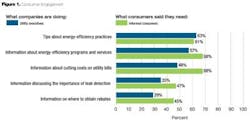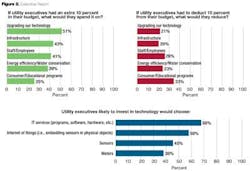Maximizing Opportunities: Managing Our Water Resources to Shape the Next Century
Itron's Resourcefulness Index measured perceptions of over 600 utility executives and 800 consumers in 14 countries on critical operational issues.
By Sharelynn Moore
In developed countries around the world, water, gas and electric utility infrastructure is aging. We rely on the same water and gas pipes laid decades ago as well as an electric grid built over 100 years ago to reliably deliver water and energy, while utilities are tasked to be more resourceful and efficient in ensuring there is enough water and energy to meet the needs of more than seven billion people - and growing.
Water and energy are foundational to modern society, and the need to better manage them has never been greater. The two commodities are so interconnected that the risks which constrain one impact the use of the other. Further, energy is critical to water systems. In communities around the world, vast amounts of energy are used to transport water to highly populated areas with limited natural resources.
In the United States alone, more than 12 percent of total annual energy is used to heat, treat and move water.1 Energy systems also depend on water. About half of the water withdrawals each day throughout the nation are used just for cooling power plants, and the oil and gas industry uses hundreds of millions of gallons of water every day to improve production. All told, more water is withdrawn for the energy sector than for agriculture.2
The interconnectedness of energy and water paired with the need to manage and conserve water, along with the desire to provide customers with information that empowers them to control their usage and costs, means that applying knowledge and technology will be critical to our water and energy future. The way we manage water and energy will define this century, and it's time for clear industry alignment and action around the management of both.
To benchmark the current state of the industry, Itron conducted a global survey, which resulted in the first annual Itron Resourcefulness Index. The research measured perceptions of more than 600 utility executives and 800 consumers across 14 countries on issues critical to the operation of water, electric and gas utilities. The objective was to understand the views of consumers and utility executives on current challenges and long-term solutions for efficient operation of the industry, including resource use, supply, efficiency, and technology investment.
Findings identified universal alignment around the need for transformation across water, gas and electric utilities and consumers worldwide. Three key imperatives emerged from the study that outline what we all need to address to move forward:
- Greater resource efficiency is needed, and more needs to be done to ensure we're managing our finite resources wisely.
- Consumers want more information from utilities to better manage their usage and costs.
- Technology is key to helping the utility industry achieve greater efficiencies and better engage consumers.
The Index research overwhelmingly found that greater operational efficiency is needed across utilities. Nearly 60 percent of executives across water, gas and electric utilities said they think utilities are not running efficiently, and 70 percent of consumers agreed. Of that group, less than a third of consumers felt their water utility is efficient. Among water utility executives, nearly half said that operational efficiencies - largely leaks from poorly monitored and maintained pipes - have them "very concerned." That is part of a broader infrastructure investment issue for the water industry, with 57 percent of water executives saying infrastructure investment is their industry's top concern.
Concerns around water efficiency are warranted. In the U.S., the American Society of Civil Engineers (ASCE) reports that seven billion gallons of water are lost due to leaking pipes every day.3 While the Environmental Protection Agency (EPA) notes that household leaks can waste more than one trillion gallons of water each year.4
These findings drive home the fact that more needs to be done to ensure efficient use of water resources and that utilities are delivering a constant supply to consumers at a steady price. The industry faces an urgent risk that inefficiencies will prevent utilities from meeting critical - and growing - demand for water resources around the world. It also faces the consequence of lower consumer satisfaction if operational inefficiencies continue. Nearly 70 percent of consumers noted that decreased satisfaction is a top risk of continued inefficiencies in the utility sector overall.
Meanwhile, consumers are also hungry for more information. More than 85 percent said they want more information from their water utility about efficiency, including water- saving tips and programs. Likewise, consumers want help cutting costs and look to the industry as a resource. Unfortunately, many utilities today don't have all the tools needed to gather and provide this information for them. Utilities have an important and urgent opportunity to engage consumers about how they are using resources day-to-day, along with how they can improve conservation. Data is critical to achieve this. Utilities can't give consumers information about water use if they don't have it themselves.
Technology, however, is a common thread that is key to solving these issues and transforming the industry. Greater adoption of technology will provide utilities with the data that is critical to pinpointing non-revenue water lost through leaks. Additional data gathered through technology upgrades can also help consumers understand where and how they're using water resources so they can choose to make adjustments about their usage. Analytics technology can enable utilities to understand consumption patterns and allocate resources, while monitoring and measurement technology can give utilities tools to find leaks and reduce waste.
In Itron's Resourcefulness Index, executives indicated a desire to invest in technology. Nearly 60 percent of water executives said if they had an increased or surplus budget, they would prioritize investment in technology to improve and modernize infrastructure. More than half also indicated that investment would be in meters, underlining the value of data flows and operational transparency when supply is tight, infrastructure is costly and losses are proliferating.
Increasingly, smarter technologies are helping utilities with leak detection and resource management to improve efficiency and manage resources wisely. Still, there is a great deal of work to be done. Water utilities in particular have an important role to play in effective management of water resources to meet growing demand. Through collaboration across the industry as well as greater connection with consumers and investment in technology, we can achieve efficiencies and meet consumer needs.
True transformation requires all stakeholders - utilities, governments, technology companies, and consumers - to understand their role in efficient resource management and to collaborate with each other. Great work can be achieved by breaking out of traditional models and collaborating.
Cross-industry collaboration can breed greater connections that are key to success. To solve tough resource management problems, utilities and technology companies must work together to develop solutions and actualize the potential of technology. Technology innovations are only as good as their applications. Understanding how to use technology requires engagement between utility companies and technology providers to understand each other's needs and implement the smartest solutions to engage consumers and better manage resources.
Finally, the industry must continue investment in research and development. Technology needed to solve problems today will not necessarily be the same technology needed to solve the challenges of tomorrow. The only way the industry will be able to continue to advance and reliably deliver water and energy to people around the world in an efficient way is through continued innovation.
The challenges benchmarked in the Itron Resourcefulness Index - primarily the need for greater efficiency and consumer demand for more information - will be met with collaboration, connection and technology innovation across the industry. Water utilities and technology providers have an important role to play in adapting to a changing industry, and both need to act with a sense of urgency.
Consider, also, the connection between water and energy, how the use of one impacts the other and that thoughtful management of both resources is more critical than ever. The way we manage energy and water will define this century, and building smarter cities, engaging consumers in a meaningful way, and managing our limited water and energy resources requires a new way of thinking. Through collaboration, connection and continued investment, we can create a more resourceful world.
About the Author: Sharelynn Moore is vice president of corporate marketing and public affairs for Itron and has more than 17 years of experience in the energy and technology sectors. In her current role, Moore is responsible for all global marketing and public affairs activities for Itron, including development of strategic marketing objectives, oversight of internal and external communications, and management of external affairs including community investment and government relations.
References
1. Sanders, K.T. and M.E. Webber. "Evaluating the energy consumed for water use in the United States," Environmental Research Letters, Vol. 7, Issue 3, September 2012.
2. Webber, M.E. "Will Drought Cause the Next Blackout?," New York Times, July 23, 2012.
3. American Society of Civil Engineers. "ASCE 2013 Report Card for America's Infrastructure," http://www.infrastructurereportcard.org/.
4. Environmental Protection Agency. "Water Sense," http://www.epa.gov/watersense/.




